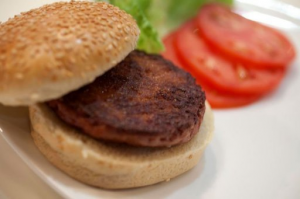What if this was the cure for cancer in a burger? Lab meat could be cheaper and definitely saves on valuable grazing land. A lot of science for the burger and plenty of ketchup.
By Alice Ritchie (AFP)–22 hours ago
LONDON — Scientists unveiled the world’s first lab-grown beef burger in London on Monday, frying it in a little oil and butter and serving it to volunteers in what they hope is the start of a food revolution.
The tasters pronounced the 140-gram (five-ounce) patty, developed at a cost of more than 250,000 euros ($330,000) with backing from Google co-founder Sergey Brin, as “close to meat” in flavour and texture but not as juicy.
The so-called “cultured beef” — dubbed the “Frankenburger” — was made using strands of meat grown from muscle cells taken from a living cow, mixed with salt, egg powder and breadcrumbs and coloured with beetroot juice and saffron.
Professor Mark Post of Maastricht University in the Netherlands, who led the research, claimed it could eventually replace ordinary beef in the diets of millions of people and in so doing reduce the huge environmental pressure caused by raising livestock.
Post insisted the artificial beef is safe, promising to give the leftovers from Monday’s tasting to his children.
“I ate it myself a couple of times with no hesitation whatsoever… I would feel perfectly comfortable letting them taste it,” he told journalists at the tasting.
Post acknowledged that the technology was at a very early stage but predicted the meat could be on supermarket shelves in 10 to 20 years. “This is just to show that we can do it,” he said.
The first public tasting took place at a west London theatre, where a professional chef cooked the round, pink patty over low heat at a kitchen counter similar to those used in TV cookery shows.
One of the volunteers, Austrian food researcher Hanni Ruetzler, cut into it carefully, before declaring: “It’s close to meat. It’s not that juicy, but the consistency is perfect.”
US-based author Josh Schonwald, the other volunteer, added: “The absence is the fat. There’s a leanness to it. But the bite feels like a conventional hamburger.”
He remarked that the whole experience was rather unnatural, jokingly complaining that he should have been allowed to try the beef with a little tomato ketchup.
The scientists took stem cells from organic cows and placed them in a nutrient solution to create muscle tissue, which then grew into small strands of meat.
The burger required 20,000 such strands, grown over three months.
Proponents of test-tube meat cite a variety of reasons for supporting it, from animal welfare to the environment and even public health — lab-created meat theoretically carries no risk of disease and is not treated with antibiotics.
According to a report from the UN Food and Agricultural Organisation, global meat production will more than double between 2000 and 2050, to 465 million tonnes.
Campaigners say such demand is putting unsustainable pressure on the planet, both through the feed required for the animals and the methane gas they produce, which contributes to global warming.
Animal rights group Peta has offered a prize of $1 million (750,000 euros) for the first lab to produce and bring to market in-vitro chicken meat, and is funding research in the United States.
Google entrepreneur Brin stepped in to support the Maastricht project after funding from the Dutch government ran out.
“There are basically three things that can happen going forward. One is that we all become vegetarian. I don’t think that’s really likely,” he said in a video message.
“The second is we ignore the issues and that leads to continued environmental harm, and the third option is we do something new.”
Britain’s Vegetarian Society questioned the need for such technology when people could just stop eating meat.
Post said: “We are catering for beef eaters eating beef in an environmentally friendly and ethical way. Let the vegetarians remain vegetarians.”
Dr Neil Stephens, a sociologist based at Cardiff University who has studied test-tube meat, said it remained to be seen whether the public would accept it.
“It is so unusual, so ambiguous, that I think questions will be raised about whether this is meat at all,” he said.
He added that it could be many years before the meat is ready to be sold to the public.
“Challenges include up-scaling production so that significant quantities can be made at a competitive price,” he said.
“What will be interesting is, in the coming weeks, watching the response to see how many people are convinced by the technology.”
